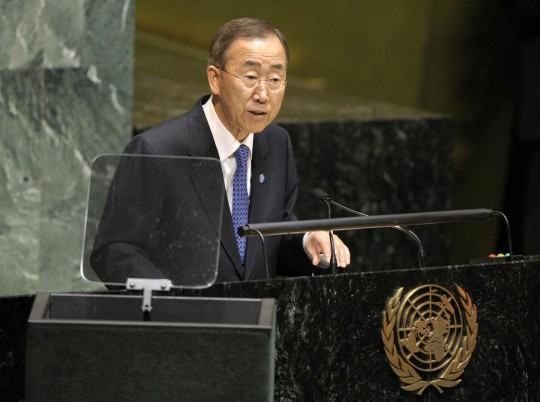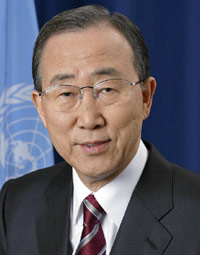UN launches global campaign to curb death toll from non-communicable diseases
UN launches global campaign to curb death toll from non-communicable diseases.
The United Nations today launched an all-out attack on non-communicable diseases (NCDs) such as cancer and diabetes with a summit meeting devoted to curbing the factors, like tobacco and alcohol use, behind the often preventable scourge that causes 63 per cent of all deaths.

The two-day high-level General Assembly meeting, attended by more than 30 heads of State and Government and at least 100 other senior ministers and experts, adopted a declaration calling for a multi-pronged campaign by governments, industry and civil society to set up by 2013 the plans needed to curb the risk factors behind the four groups of NCDs – cardiovascular diseases, cancers, chronic respiratory diseases and diabetes.
Steps range from price and tax measures to reduce tobacco consumption to curbing the extensive marketing to children, particularly on television, of foods and beverages that are high in saturated fats, trans-fatty acids, sugars, or salt. Other measures seek to cut the harmful consumption of alcohol, promote overall healthy diets and increase physical activity. The overall toll of NCDs is estimated at 36 million out of a total of 57 million annually.
“This will be a massive effort, but I am convinced we can succeed,” Secretary-General Ban Ki-moon told the opening session of the landmark summit, only the second ever to deal with health (the first was HIV/AIDS), noting that over a quarter of all people who die from NCDs succumb in the prime of their lives, the vast majority of them in developing countries.
“Our collaboration is more than a public health necessity. Non-communicable diseases are a threat to development. NCDs hit the poor and vulnerable particularly hard, and drive them deeper into poverty,” he said, with millions of families pushed into poverty each year when a member becomes too weak to work or when the costs of medicines and treatments overwhelm the family budget.
“The prognosis is grim. According to the World Health Organization (WHO), deaths from NCDs will increase by 17 per cent in the next decade. In Africa, that number will jump by 24 per cent.”
He called on governments, individuals, civic groups and businesses to all play their part. “There is a well-documented and shameful history of certain players in industry who ignored the science, sometimes even their own research, and put public health at risk to protect their own profits,” he said.
“There are many, many more industry giants which acted responsibly. That is all the more reason we must hold everyone accountable, so that the disgraceful actions of a few do not sully the reputation of the many which are doing such important work to foster our progress,” he added, calling on corporations that profit from selling processed foods to children, including manufacturers, media, marketing and advertising companies, to act with the utmost integrity.
General Assembly President Nassir Abdulaziz Al-Nasser stressed the need for international cooperation to tackle the problem. “The global community must work together to monitor, reduce exposure to risks, and strengthen health care for people with non-communicable diseases,” he said.
“The impact of this loss, this tragedy, goes beyond individuals, beyond families. NCDs are altering demographics. They are stunting development. And they are impacting economic growth.”
The summit declaration calls for greater measures at global, regional and national levels to prevent and control NCDs, stresses that about 9 million of the deaths occur before the age of 60, with nearly 80 per cent of those in developing countries, and cites “the vicious cycle whereby non-communicable diseases and their risk factors worsen poverty, while poverty contributes to rising rates of non-communicable diseases.”
Noting that “the rising prevalence, morbidity and mortality” of NCDs can be largely prevented and controlled through collective and multisectoral action by all Member States and other relevant stakeholders, it highlights the need for universal national health coverage and strengthened international cooperation to provide technical assistance and capacity-building to developing countries.
It calls on WHO, as the lead UN specialized agency for health and the vanguard of the global effort, to set up a comprehensive global monitoring framework and prepare recommendations for voluntary global targets before the end of 2012.
###
…
…
Mr. Ban Ki-moon, UN Secretary-General, 3rd plenary meeting (NCDs) – General Assembly
General Assembly: 3rd plenary meeting
Statement by His Excellency Mr. Ban Ki-moon, UN Secretary-General, at the opening of the High-level meeting on the prevention and control of non-communicable diseases
###
###

Ban Ki-moon
Secretary-General of the United Nations.
Ban Ki-moon is the eighth Secretary-General of the United Nations. His priorities have been to mobilize world leaders around a set of new global challenges, from climate change and economic upheaval to pandemics and increasing pressures involving food, energy and water. He has sought to be a bridge-builder, to give voice to the world’s poorest and most vulnerable people, and to strengthen the Organization itself.“I grew up in war”, the Secretary-General has said, “and saw the United Nations help my country to recover and rebuild. That experience was a big part of what led me to pursue a career in public service. As Secretary-General, I am determined to see this Organization deliver tangible, meaningful results that advance peace, development and human rights.”Mr. Ban took office on 1 January 2007. Highlights of his tenure have included:
Promoting sustainable development
One of the Secretary-General’s first major initiatives was the 2007 Climate Change Summit, followed by extensive diplomatic efforts that have helped put the issue at the forefront of the global agenda. Subsequent efforts to focus on the world’s main anti-poverty targets, the Millennium Development Goals, have generated more than $60 billion in pledges, with a special emphasis on Africa and the new Global Strategy on Women’s and Children’s Health. At the height of the food, energy and economic crises in 2008, the Secretary-General successfully appealed to the G20 for a $1 trillion financing package for developing countries and took other steps to guide the international response and protect the vulnerable and poor.
Empowering women
The Secretary-General pressed successfully for the creation of UN Women, a major new agency that consolidates the UN’s work in this area. His advocacy for women’s rights and gender equality has also included the “Unite to End Violence against Women” campaign, the “Stop Rape Now” initiative, the creation of a “Network of Men Leaders” and the establishment of a new Special Representative on Sexual Violence in Conflict. Within the UN itself, the Secretary-General has increased the number of women in senior management positions by more than 40 per cent, reaching the highest level in the Organization’s history.
Supporting countries facing crisis or instability
The Secretary-General has sought to strengthen UN peace efforts, including through the New Horizons peacekeeping initiative, the Global Field Support Strategy and the Civilian Capacity Review, a package of steps to improve the impact of the 120,000 United Nations “blue helmets” operating in the world’s conflict zones. A mediation support unit, along with new capacity to carry out the Secretary-General’s good offices, have been set up to help prevent, manage and resolve tensions, conflicts and crises. Accountability for violations of human rights has received high-level attention through inquiries related to Gaza, Guinea, Pakistan and Sri Lanka, legal processes in Lebanon and Cambodia, and advocacy for the “responsibility to protect,” the new United Nations norm aimed at prevent and halt genocide and other grave crimes. He has also sought to strengthen humanitarian response in the aftermath of mega-disasters in Myanmar (2008), Haiti (2010) and Pakistan (2010), and mobilized UN support for the democratic transitions in North Africa and the Middle East.
Generating new momentum on disarmament, arms control and non-proliferation
The Secretary-General has sought to rejuvenate the disarmament agenda through a five-point plan, efforts to break the deadlock at the Conference on Disarmament and renewed attention to nuclear safety and security in the aftermath of the tragedy at the Fukushima Daiichi Nuclear Power Plant.
Strengthening the UN
The Secretary-Generalhas introduced new measures aimed at making the United Nations more transparent, effective and efficient. These include heightened financial disclosure requirements, compacts with senior managers, harmonization of business practices and conditions of service, the adoption of International Public Sector Accounting Standards, and continued investments in information technology and staff development.
Personal
The Secretary-General was born in the Republic of Korea on 13 June 1944. He received a bachelor’s degree in international relations from Seoul National University in 1970. In 1985, he earned a master’s degree in public administration from the Kennedy School of Government at Harvard University.At the time of his election as Secretary-General, Mr. Ban was his country’s Minister of Foreign Affairs and Trade. His 37 years of service with the Ministry included postings in New Delhi, Washington D.C. and Vienna, and responsibility for a variety of portfolios, including Foreign Policy Adviser to the President, Chief National Security Adviser to the President, Deputy Minister for Policy Planning and Director-General of American Affairs.Mr. Ban’s ties to the United Nations date back to 1975, when he worked for the Foreign Ministry’s United Nations Division. That work expanded over the years, with assignments that included service as Chairman of the Preparatory Commission for the Comprehensive Nuclear Test Ban Treaty Organization and Chef de Cabinet during the Republic of Korea’s 2001-2002 presidency of the UN General Assembly. Mr. Ban has also been actively involved in issues relating to inter-Korean relations.The Secretary-General speaks English, French and Korean. He and his wife, Madam Yoo (Ban) Soon-taek, whom he met in high school in 1962, have one son, two daughters and three grandchildren. Since 2007, Mrs. Ban has devoted her attention to women’s and children’s health, including autism, the elimination of violence against women, and the campaign to prevent mother-to-child transmission of HIV/AIDS.
###
> United Nations (UN).
 The United Nations was established on 24 October 1945 by 51 countries committed to preserving peace through international cooperation and collective security. Today, nearly every nation in the world belongs to the UN: membership totals 192 countries.
The United Nations was established on 24 October 1945 by 51 countries committed to preserving peace through international cooperation and collective security. Today, nearly every nation in the world belongs to the UN: membership totals 192 countries.
When States become Members of the United Nations, they agree to accept the obligations of the UN Charter, an international treaty that sets out basic principles of international relations. According to the Charter, the UN has four purposes:
- to maintain international peace and security;
- to develop friendly relations among nations;
- to cooperate in solving international problems and in promoting respect for human rights;
- and to be a centre for harmonizing the actions of nations.
###
* The above story is adapted from materials provided by United Nations (UN)
** More information at United Nations (UN)


















